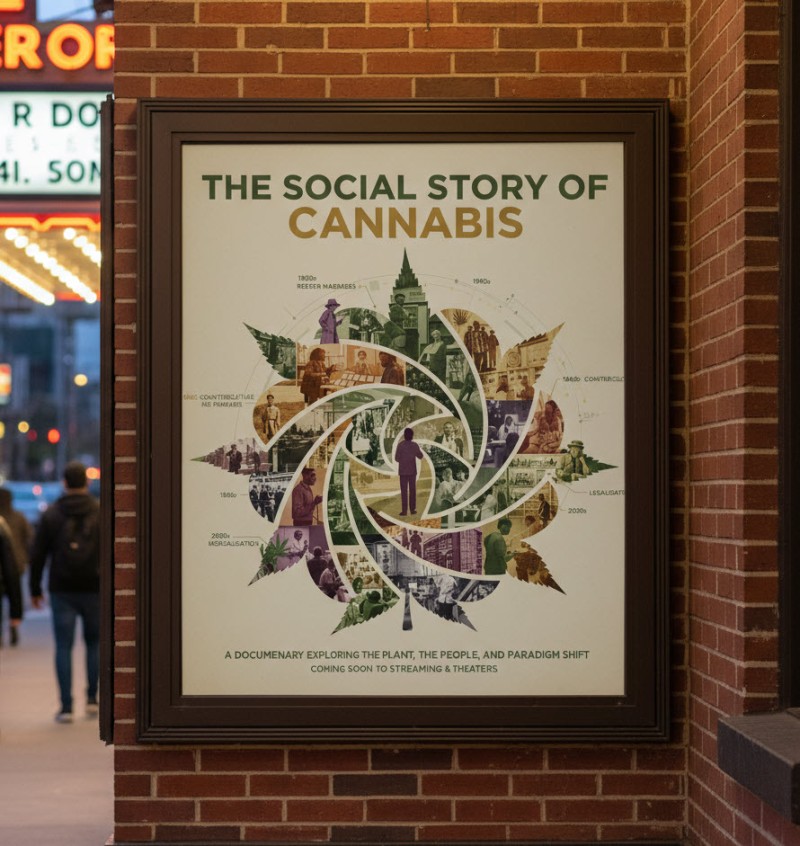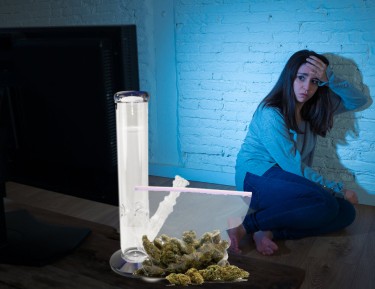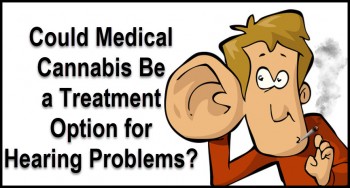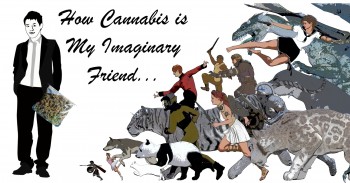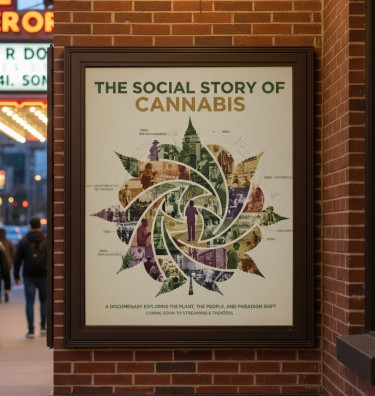
The Social Story of Cannabis
While cannabis in its essence is just a plant, attached to it are perspectives and internal narratives that shape our societal relationship with it. If you're an extreme conservative puritan, you might see it as evil, a dangerous drug that destroys one's soul. If you're a regular human being, you'll likely see it as a plant that, if consumed in a variety of manners, will have a psycho-physical effect on the individual.
The reason we have such wild and divergent views is because there are narratives around the plant that exist and are reinforced by the "powers that be." As I've written previously, the government isn't particularly fond of cannabis and often utilizes it as a political weapon - a pawn in a much larger game of control and influence.
Then there's the "Pro-Cannabis" folk who spin the narrative in their favor, advocating for its benefits perhaps a bit too enthusiastically at times. And sitting underneath this mountain of "story" is a simple plant that's been on this planet longer than we have, quietly existing while humans argue about what it means.
The social narrative around cannabis has always been in flux, shifting with political winds, cultural movements, and economic interests. But recently, I've noticed a fascinating trend - while more states legalize and public acceptance grows, there's been a curious uptick in negative press and dubious studies making the rounds in mainstream media. This dichotomy points to a growing schism between those in power and the will of the people.
Today we're diving into the Social Story of cannabis - how these narratives are created, who benefits from them, how they change over time, and what that means for the plant's future in our society. Because sometimes, understanding the story is just as important as understanding the plant itself.
A Rose by Any Other Name
Cannabis has accumulated many names over its long relationship with humanity. Marijuana, weed, pot, grass, ganja, reefer, dope - the list goes on. Each name carries its own connotation, its own history, and often its own baggage. "Marijuana" itself was popularized in America specifically to associate the plant with Mexican immigrants and stoke xenophobic fears. The term you use often reveals when you came of age, your cultural background, or even your political leanings.
But when we strip away all these labels and the prejudices they carry, what are we left with? A plant. A simple plant that produces seeds, which can be placed in dirt, given water and sunshine, and will produce a flower. Depending on the type of cannabis plant (Hemp or higher-THC varieties), you can derive up to 50,000 uses from it - from textiles and building materials to medicine and recreation. It's a plant that's been around since we first started building societies, and probably one of the first crops cultivated by humankind.
Archaeological evidence suggests cannabis has been used by humans for at least 12,000 years. Hemp fiber imprints have been found on pottery dating back to ancient China. The plant's seeds were used as food, its stalks for fiber, and its flowers for medicinal and spiritual purposes across ancient civilizations from India to Egypt to Greece.
Yet, this "Plant Medicine Teacher" - as some indigenous cultures have referred to it - does something that makes those in power uncomfortable: it makes people less complacent to the status quo. Those altered states of consciousness, the questioning of established norms, the community-building among users - these aspects have long made cannabis a target for those who prefer a more docile population. And so they've worked diligently to erase the rich history of cannabis and humankind, demonizing it with manipulated data and fear campaigns.
Since I started writing about cannabis over 15 years ago, I've watched every political party in the US and every President utilize it to sway votes, make empty promises, and ultimately avoid significant reform. Cannabis legalization sounds good on the campaign trail, but the vast majority of actual reform in the US has come from individual states deciding to end the madness on their own.
Just look at the current landscape - we have nearly 40 states with medical cannabis programs and around half with adult-use legalization, yet federally it remains a Schedule I substance with "no currently accepted medical use" and "high potential for abuse." The cognitive dissonance is staggering.
Looking at today's climate, it seems that states will need to continue this fight for the foreseeable future. Unless, of course, someone can appeal to the right people's egos, which brings us to our next topic...
An Attempt to Hook a President
A recent ad from a cannabis industry-funded political action committee, "The American Rights and Reform PAC," highlights perfectly the nature of narrative manipulation in the cannabis space. In their advertisement, they appeal to former President Trump's campaign promises about "Making America Healthy Again" and call out the Biden Administration's supposed "war on medical cannabis."
The narrative is insanely biased and slanted, designed specifically to appeal to the man with the orange hair, illustrating perfectly the point I've been making about cannabis being used as a political football. The ad conveniently omits that it was Biden who initiated the federal review to reschedule cannabis to Schedule III (even though that process stalled), while giving Trump credit for being some kind of champion for patient rights.
This implementation of narrative-jujitsu is fascinating to watch - taking the existing popular support for cannabis and attempting to redirect it toward a specific political figure. I've seen this game played from both sides of the aisle for years. Democrats promise legalization but deliver half-measures; Republicans rail against federal overreach but won't champion descheduling.
However, as of now, I'm not seeing any significant movement from the Federal Government concerning cannabis reform. On the contrary, I'm beginning to see a lot of "negative studies" with dubious claims being promoted on all major news outlets. Suddenly we're hearing more about "cannabis-induced psychosis," "dangerous potency levels," and other fear-based messaging that feels straight out of the 1980s playbook.
This is a clear attempt to hijack the current narrative and sway public opinion. But the question remains: will it have any effect? Several generations have now grown up under a more pro-cannabis ideology, and many parents today consume cannabis themselves - more than you might think. The cat is out of the bag, the toothpaste is out of the tube, and all those other metaphors for "you can't put this back."
Are these negative narratives the final desperate gasps of a dying prohibitionist system, or are they the opening salvos in a revamped War on Drugs? Does the authoritarian state wish to strike back against the progress made? The corporate interests behind the "American Rights and Reform PAC" clearly think they can co-opt the movement for their own benefit, but will everyday cannabis users follow along?
The Sticky Bottom Line
At the end of the day, don't expect anyone to hand you your freedom - that is earned through persistent effort and vigilance. While the narratives on a social scale might shift with political winds and corporate interests, those who understand the history of cannabis and the Drug War will not be easily swayed. Most people now favor cannabis legalization, and despite the regime attempting to alter that trajectory, I don't think these renewed fear campaigns will have a major effect.
However, how long until the War on Cannabis is truly over? That I cannot say for sure. There is definitely a concerted effort to derail the progress made over the past decade, and right now everything feels uncertain. The pendulum of public opinion and policy has swung toward acceptance, but pendulums have a way of swinging back when we least expect it.
What I do know is that irrespective of what happens on the big scale - in Washington D.C., in corporate boardrooms, or in media narratives - it's what each and every one of us do on the small scale that really matters. Your personal relationship with this plant, the conversations you have about it with friends and family, the voting choices you make, the businesses you support - these individual actions collectively shape the broader social story.
Your freedom is always yours, even if the law hasn't caught up yet. Cannabis has survived thousands of years of human civilization, weathered countless prohibitions, and will continue to grow long after the current political players have left the stage. The plant abides, friends. And so shall we.

